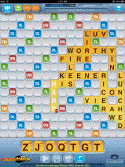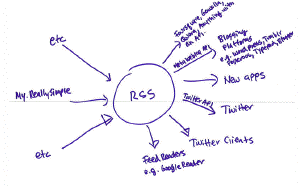
 Words with Friends, Facebook & Apple
Words with Friends, Facebook & Apple 
I grew up in a family of Scrabble players, but I wasn't one of them. My creativity doesn't like Scrabble-like pressure. I quickly get frustrated and want to quit. I always wondered about this because I love crosswords. I guess for me words are a solitary thing, not a social thing.
Until I tried Words With Friends.
 A couple of my friends from California were pinging me about this. "Dave let me know when you start playing Words With Friends." So I tried it and I like it. A lot. I'm getting good (or at least better). It's relaxing, and you learn a lot about the person you're playing with, even though they might be very far away. Some people get that Words With Friends is a collaboration even though you're playing against the person you're collaborating with. I like to win, but I also like it when my opponent is generous. I try to be generous, when I can.
A couple of my friends from California were pinging me about this. "Dave let me know when you start playing Words With Friends." So I tried it and I like it. A lot. I'm getting good (or at least better). It's relaxing, and you learn a lot about the person you're playing with, even though they might be very far away. Some people get that Words With Friends is a collaboration even though you're playing against the person you're collaborating with. I like to win, but I also like it when my opponent is generous. I try to be generous, when I can.
This led me to an interesting conclusion about Words With Friends in relation to Apple and Facebook.
1. Re Apple, their social network was a flop. But WWF shows they don't have to do anything to have a really great social network boot up on their platform, something far more interesting than the money-motivated network they tried to build out of music of all things. I don't mind paying but they made it about paying. Uck.
2. Re Facebook, funny they are procrastinating about getting their APIs into the iPad environment. Words With Friends would make a fantastic Facebook app. A really fantastic Facebook app. Hey for all I know they have somehting like WWF, but this is the network I'm on for now. Facebook should be in here too, it seems to me.
Anyway, I waited a long time to write this post cause I can only play so many games without losing my whole life to WWF. So don't be pissed if I don't accept your invite to play. ![]()
PS: It looks like they were bought by Zynga.
 Connecting reallysimple.org to Twitter
Connecting reallysimple.org to Twitter 
I did a schematic for an earlier blog post that showed where RSS fit into the roadmap for all the various places I want my ideas and links to flow.
One of the endpoints is Twitter. For that, I'm relying on TwitterFeed, because I have developed a good relationship with Aditya Chadha, who is the developer of that fine service.
Here's how it all fits together (assuming it works).
1. I post something to my linkblog feed.
2. I pull a string on TwitterFeed telling him that the feed updated and he should check for something new.
3. He checks, and finds something new. Shortens the link through Adjix (run by Joe Moreno, another developer I enjoy working with) and then pushed the link to Twitter.
3a. All this happens (Murhphy-willing) within a few seconds. Maybe even less! ![]()
4. And voila, the link appears on Twitter. Look ma no hands. I did it all from the UI of my.reallysimple.org.
This post will be the first one to flow through this new regime. Wish us (Joe, Aditya and myself) luck!
![]()
PS: Took about ten seconds from pulling the string to having the link show up in my Twitter feed. Joe and Aditya you guys are the best! ![]()
 NYT on future-safe archives
NYT on future-safe archives 
Over the years I've written frequently about making the web a more permanent medium, I call the topic "future-safe archives."
Yesterday there was an excellent article in the NY Times Magazine by Rob Walker on this topic. He contacted me via email initially in August of last year, and we exchanged 21 emails, some quite lengthy, over the months.
I appreciate the thought he put into this story, and now that the Times has written on it, maybe we can make some progress in assuring that people who want to create lasting works on the web have a way to do it.




